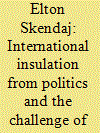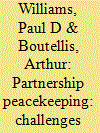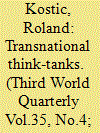| Srl | Item |
| 1 |
ID:
133481


|
|
|
|
|
| Publication |
2014.
|
| Summary/Abstract |
Can international actors build effective state bureaucracies in postwar countries? While the literature on state institutions suggests they are best built under local ownership, this article shows how international actors in collaboration with local actors managed to build two effective state bureaucracies in postwar Kosovo: the police force and the customs service. Contrary to the article's Hypothesis 1 on local ownership, international actors insulated the effective bureaucracies from political and societal influences in order to prevent them from becoming sites of patronage. Thus, these institutions built on meritocratic recruitment and promotion. Employing a comparative research design, the article utilizes national survey data as well as data from 150 semistructured interviews conducted during ten months of fieldwork in Kosovo. By contrasting the state's constituent bureaucracies, which vary in effectiveness, and thus avoiding the reduction of the state to a unitary abstract actor, this research offers a fresh perspective on postwar state building. Furthermore, it contributes three innovative sets of indicators to measure effective bureaucracies: mission fulfillment, penalization of corruption, and responsiveness to the public.
|
|
|
|
|
|
|
|
|
|
|
|
|
|
|
|
| 2 |
ID:
133250


|
|
|
|
|
| Publication |
2014.
|
| Summary/Abstract |
The relationship between the United Nations (UN) and the African Union (AU) has at times been characterized by considerable conflict, mistrust, and tension, often hindering the predictability and conduct of effective peace operations. This article analyses the challenges facing UN-AU cooperation on peace and security issues and examines their partnerships in various peace operations. Specific attention is paid to the crucial cases of Somalia and Mali, which exemplify some of the positive and negative aspects of this relationship. We argue that while great power politics and the international normative context have played important roles in structuring debates about peace operations in contemporary Africa, so too have two more bottom-up factors: the specific operational and financial challenges generated by the AU's big missions in Darfur, Somalia, and Mali, and the organizational cultures and bureaucratic constraints within which both institutions have had to work. Greater focus on these bottom-up factors could bring significant improvements to the decision-making processes in Addis Ababa and New York, to operational responses, and to the conduct of peace operations.
|
|
|
|
|
|
|
|
|
|
|
|
|
|
|
|
| 3 |
ID:
133259


|
|
|
|
|
| Publication |
2014.
|
| Summary/Abstract |
Peace-building situations can be described as battlefields of ideas where key international policy makers engage in internal battles for control over intervention policy. Knowledge production, based on timely information and analysis, is seen as crucial to winning these battles of ideas. By providing detailed information, analysis and recommendations, the International Crisis Group (icg) has assumed an important role in this process. Yet we know little about the specific role the icg plays in battles for intervention policy. This article investigates icg analyses and recommendations and the way they fit into the specific internal debates within the international community in Bosnia and Herzegovina (BiH) in 2000-01. By looking at the work of the icg in BiH around the elections in 2000, the article demonstrates that it often acted as a legitimising agent of US positions and policy in the country.
|
|
|
|
|
|
|
|
|
|
|
|
|
|
|
|